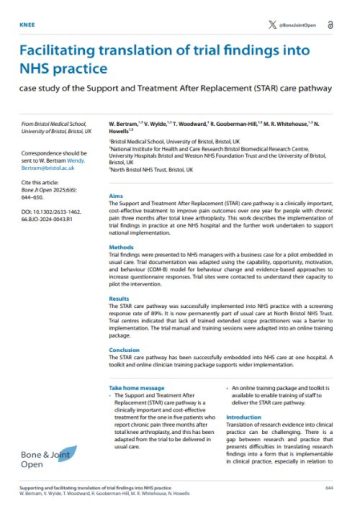Treatment plan for patients in pain after knee surgery has been implemented
- 14 July 2025
A treatment plan for patients still experiencing pain 3 months after total knee replacement surgery has been successfully implemented at North Bristol NHS Trust. The study, led by BRC researchers, is published in Bone and Joint Open.
The treatment plan is now part of standard care at Southmead Hospital. This study shows how trial findings can be translated into NHS practice.
An online manual and training package are available on the NHS Learning Hub, allowing other hospitals across the UK to train their staff to implement the treatment plan.
Over 100,000 knee replacements are performed every year in the UK. One in five patients still experience pain three months after their surgery.
Researchers have created a complex, personalisable treatment plan for these patients. A trial showed that this treatment is cost effective and can reduce long-term pain.
But translating findings like these into standard hospital care is difficult and requires the buy-in of healthcare professionals, hospital managers and policymakers. This study has demonstrated that this is possible.
The treatment plan involves identifying patients who are still in pain 3 months after total knee replacement, assessing the causes of their pain, and referring them to existing services for treatment.
This has been shown to reduce the pain patients experience in the long term. It also saves the NHS, on average, £724 per treated patient, by reducing the number of patients who need to return to hospital and the length of time they stay.
Patients at North Bristol NHS Trust now have access to this treatment. The researchers hope the online materials they have created will allow other NHS hospitals to offer it, benefiting knee replacement patients across the UK.
Wendy Bertram, Senior Research Associate at the University of Bristol, said:
“Facilitating change in the NHS can be challenging, especially for a personalised treatment plan like this one.
“Working closely with NHS managers and clinicians was key to making this treatment available to the people who need it, improving their recovery and saving valuable NHS resources.”
